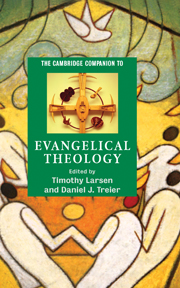Book contents
- Frontmatter
- 1 Defining and locating evangelicalism
- Part I: Evangelicals and Christian doctrine
- Part II: The contexts of evangelical theology
- 10 Evangelical theology and culture
- 11 Evangelical theology and gender
- 12 Race and the experience of death: theologically reappraising American evangelicalism
- 13 Evangelical theology and the religions
- 14 Evangelical theology in African contexts
- 15 Evangelical theology in Asian contexts
- 16 British (and European) evangelical theologies
- 17 Evangelical theology in Latin American contexts
- 18 Evangelical theology in North American contexts
- Index
16 - British (and European) evangelical theologies
from Part II: - The contexts of evangelical theology
Published online by Cambridge University Press: 28 September 2007
- Frontmatter
- 1 Defining and locating evangelicalism
- Part I: Evangelicals and Christian doctrine
- Part II: The contexts of evangelical theology
- 10 Evangelical theology and culture
- 11 Evangelical theology and gender
- 12 Race and the experience of death: theologically reappraising American evangelicalism
- 13 Evangelical theology and the religions
- 14 Evangelical theology in African contexts
- 15 Evangelical theology in Asian contexts
- 16 British (and European) evangelical theologies
- 17 Evangelical theology in Latin American contexts
- 18 Evangelical theology in North American contexts
- Index
Summary
It is possible to tell the story of the British evangelical movement as beginning with a theological discovery. The tale of John Wesley's quest for assurance, and his discovery of the Reformation doctrine of salvation sola fide, remains iconic and, with the heart “strangely warmed” from trusting Christ alone for forgiveness, these experiences remain central to evangelical theology and culture alike. Evangelicalism, at least in its British formulations, however, has never particularly been a movement that is driven by, or even possessed of, a distinctive theology, a point made particularly clear by considering the wider European context. Wesley's evangelical conversion took place at a Moravian meeting, after all, listening to a reading from Luther. Yet Moravians, even Böhler's societies, and Lutherans, even Pietistic ones, are not generally included under the heading “evangelical.” Further, if the doctrine of salvation by faith alone is to be the distinctive mark, then there were many teaching that doctrine in England in Wesley's day, often with far more theological sophistication than any evangelical in eighteenth-century Britain, and these were sharply opposed to the new movement.
The two most significant recent historians of evangelicalism, David Bebbington and Mark Noll, have defined the movement in non-theological ways. Noll focuses on social context and contacts: evangelicalism is primarily a network, or a series of networks, with individuals identified as belonging to the movement if they are a part of the network. Bebbington’s famous fourfold definition, that evangelicals are cross-centred, conversionist, biblicist, and activist, implies some theological beliefs, but there is no sense in which there is a distinctive theology that is evangelical, and only evangelical. In its early expressions in Britain at least, evangelicalism was a movement defined by relationships and activities at least as much as by theology.
- Type
- Chapter
- Information
- The Cambridge Companion to Evangelical Theology , pp. 241 - 258Publisher: Cambridge University PressPrint publication year: 2007
- 1
- Cited by

